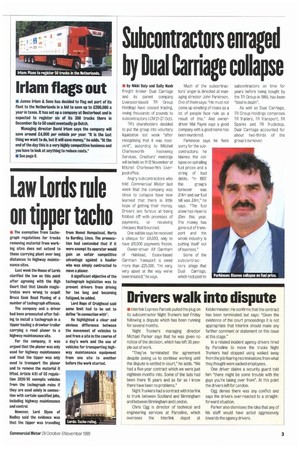Subcontractors enraged by Dual Carriage collapse
Page 5

If you've noticed an error in this article please click here to report it so we can fix it.
• by Nikki Daly and Sally Nash Freight broker Dual Carnage and its parent company Liverpool-based TR Group Holdings have ceased trading, owing thousands of pounds to subcontractors (CM21-27 Oct).
TR's shareholders decided to put the group into voluntary liquidation last week "after recognising that it was insolvent", according to Mitchell
Charlesworth Insolvency Services. Creditors' meetings will be held on 11-12 November at Mitchell Charlesworth's Liverpool office.
Angry subcontractors who told Commercial Motor last week that the company was close to collapse have now learned that there is little hope of getting their money. Drivers are furious at being fobbed off with promises of
payments, or receiving cheques that bounced.
One subbie says he received a cheque for 24,000, only to have 211,000 payments frozen.
Owner-driver Aif Garnham of Halstead, Essex-based Garnham Transport is owed more than £25,000. "I'm very, very upset at the way we've been treated," he says. Much of the subcontractors' anger is directed at managing director John Parkinson. One of them says: "He must not come up smelling of roses as a lot of people face ruin as a result of this.'' And ownerdriver Mal Payne says a good company with a good name has been murdered.
Parkinson says he feels sorry for the subcontractors: he blames the collapse on spiralling fuel prices and a string of bad debts. "In 1997
the group's turnover was
114m and our fuel bill was4m," he says. "The fuel alone has risen to 15m this year. The money has gone out of transport and the whole industry is putting itself out of business."
Some of the subcontractors allege that Dual Carriage, which had paid its subcontractors on time for years before being bought by the TA Group in 1995, has been "bled to death".
As well as Dual Carriage, TA Group Holdings comprises TR Trailers, TA Transport, TR Spares and TR Truckstop. Dual Carriage accounted for about two-thirds of the group's turnover.
















































































































